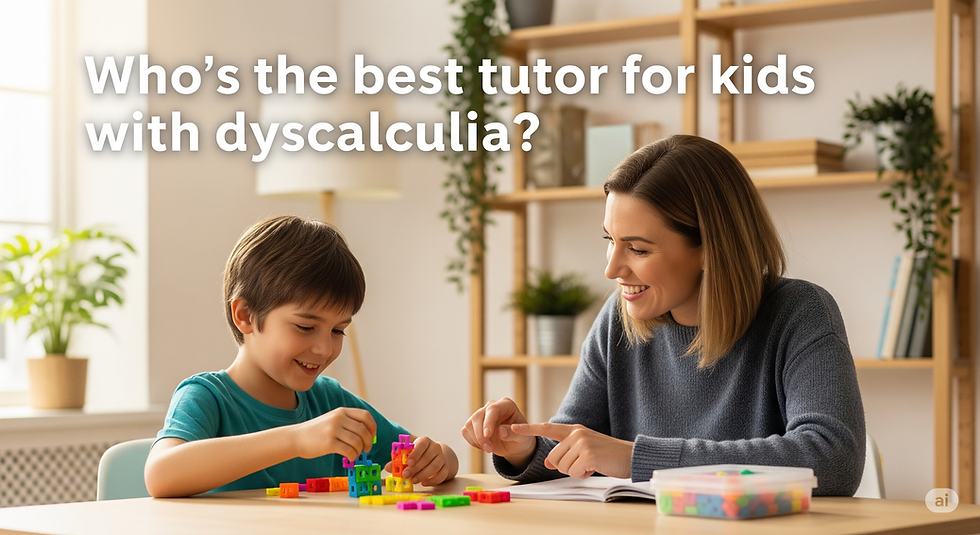Understanding Specialized Math Tutoring Benefits
- Susan Ardila

- Aug 6, 2025
- 4 min read
Let’s face it - math can be a beast. For many kids, especially those who think differently, numbers and equations might feel like a foreign language. But what if there was a way to speak math in a way that truly clicks? That’s where customized math tutoring methods come into play. These aren’t your run-of-the-mill worksheets or cookie-cutter lessons. Nope. We’re talking about tailored approaches that meet your child exactly where they are, making math not just manageable but downright enjoyable.
Imagine your child’s confidence soaring as they finally get those tricky concepts. Imagine the relief of seeing frustration turn into curiosity. That’s the power of personalized math support. Ready to dive in? Let’s explore how these methods work, why they matter, and how to choose the best fit for your family.
Why Specialized Math Tutoring Methods Matter More Than Ever
You might be wondering, “Why can’t my child just learn math like everyone else?” Here’s the truth: every brain is wired differently. Especially for neurodivergent learners, traditional teaching methods often miss the mark. Customized math tutoring methods recognize this diversity and adapt accordingly.
Think of it like a tailor-made suit versus off-the-rack clothing. The off-the-rack might fit okay, but the tailored suit fits perfectly - it complements your child’s unique learning style, strengths, and challenges. This approach can include:
Multisensory instruction that engages sight, sound, and touch
Executive function coaching to build skills like organization and focus
Flexible pacing that respects your child’s rhythm
Parent partnership to keep everyone in the loop and motivated
These methods don’t just teach math; they build math confidence. And confidence? That’s the secret sauce for long-term success.

Exploring Customized Math Tutoring Methods: What Works Best?
So, what exactly does a customized math tutoring session look like? It’s not just about solving problems on paper. It’s about creating an experience that resonates with your child’s brain. Here’s a peek into some effective methods:
1. Multisensory Learning
This method uses multiple senses to teach math concepts. For example, your child might use physical objects to count, draw diagrams, or listen to rhythmic patterns that explain multiplication. This approach helps anchor abstract ideas in concrete experiences.
2. Executive Function Coaching
Math isn’t just about numbers; it’s about planning, organizing, and problem-solving. Executive function coaching helps students develop these skills, which are often challenging for neurodivergent learners. Tutors might teach strategies for breaking down complex problems or managing time during tests.
3. Technology Integration
From interactive apps to virtual manipulatives, technology can make math more engaging. Customized tutoring often incorporates tools that adapt to your child’s progress, providing instant feedback and encouragement.
4. Parent Collaboration
Your involvement is crucial. Tutors who partner with parents provide updates, suggest at-home activities, and tailor sessions based on your child’s mood and needs. This team approach ensures consistency and support beyond the tutoring hour.
5. Flexible Pacing and Goal Setting
No one likes to be rushed or held back. Customized tutoring respects your child’s pace, setting achievable goals that build momentum and celebrate wins, big or small.
By combining these methods, tutors create a rich, supportive environment where math becomes less intimidating and more like a puzzle waiting to be solved.

Which is better, Kumon or Mathnasium?
If you’ve dipped your toes into the tutoring pool, you’ve probably heard of Kumon and Mathnasium. Both are popular, but which one suits your child’s unique needs?
Kumon: The Drill Master
Kumon is known for its repetitive practice and mastery through incremental steps. It’s great for kids who thrive on routine and want to build strong foundational skills. However, it can feel rigid and may not adapt well to neurodivergent learners who need more flexibility or multisensory approaches.
Mathnasium: The Math Gym
Mathnasium offers a more personalized approach, focusing on understanding concepts rather than just practice. Tutors assess your child’s strengths and weaknesses and tailor lessons accordingly. It’s often more engaging and can be a better fit for kids who need customized pacing and support.
What to Consider
Does your child need a structured routine or flexible learning?
How important is multisensory engagement?
Is executive function coaching part of the program?
How involved are parents in the process?
For many families, a hybrid or fully customized program like specialized math tutoring that blends these elements might be the best bet.
The Real Impact: Beyond Grades and Tests
Let’s get real. The benefits of customized math tutoring go way beyond just acing tests or getting better grades. Here’s what you can expect:
Boosted Confidence: When kids understand math, they feel capable and proud. This confidence spills over into other subjects and life skills.
Reduced Anxiety: Math anxiety is real and can be paralyzing. Tailored tutoring helps ease this fear by making math approachable and fun.
Improved Executive Function: Skills like focus, organization, and problem-solving improve, helping your child in school and beyond.
Lifelong Learning Skills: Customized tutoring teaches how to learn, not just what to learn. This sets your child up for success in any challenge.
Stronger Parent-Child Connection: When parents are involved and informed, it creates a supportive home environment that encourages growth.
Imagine your child walking into math class with a smile instead of dread. That’s the kind of transformation customized tutoring can spark.

Taking the Next Step: Finding the Right Fit for Your Family
Ready to explore customized math tutoring for your child? Here’s how to get started:
Assess Your Child’s Needs: Observe where they struggle and what excites them about math.
Research Options: Look for programs that offer multisensory instruction, executive function coaching, and parent collaboration.
Ask Questions: Don’t be shy. Ask about tutor qualifications, session structure, and progress tracking.
Trial Sessions: Many programs offer trial lessons. Use these to see how your child responds.
Partner with Tutors: Stay engaged and communicate regularly to ensure the tutoring evolves with your child’s needs.
Remember, the goal is not just to improve math skills but to empower your child to thrive academically and personally.
Customized math tutoring is more than a service - it’s a partnership that transforms how your child experiences learning. With the right approach, math can become a source of confidence, curiosity, and joy. So why wait? Your child’s math breakthrough might be just one tailored lesson away.





Comments